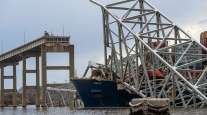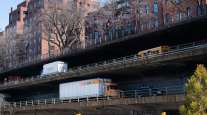Industry Execs Ask Special House Panel to Focus on Urban Transportation Issues
This story appears in the Aug. 5 print edition of Transport Topics.
Freight industry representatives asked lawmakers to confront urban transportation challenges, including congestion, intermodal connections and port infrastructure.
The House Transportation and Infrastructure Committee’s special panel on freight held a hearing in New York City on June 26 to gauge the needs and role of urban freight transportation and what it means for the rest of the country, said Rep. John Duncan (R-Tenn.), the panel’s chairman.
“Freight transportation through urban areas is a complex endeavor and has a dramatic impact on the nation’s freight system, for many reasons: Congestion, ports and large facilities are often located in urban areas, density of the population and the number of governmental entities present in urban regions,” Duncan said in his prepared statement at the hearing.
Gerry Coyle, vice president of environmental and sustainable operations at Evans Delivery Co., said urban areas frequently have the worst highway congestion, which costs trucking companies money. The New York City area, for one, has the worst freight congestion, he said.
“Congestion in the region increases freight transportation costs by more than $2.5 billion annually and slows down the delivery of nearly half a trillion dollars’ worth of goods,” Coyle said in written remarks he gave on behalf of American Trucking Associations.
The congestion problem is not unique to trucking, said William Flynn, CEO of Atlas Air Worldwide Holdings Inc. Flynn said urban airport congestion, for example, significantly slows down airfreight for the airline, headquartered in suburban New York.
“Unquestionably, more needs to be done to modernize the intermodal network and American urban transportation hubs,” Flynn said in written remarks. He pushed Congress to expedite work on the forthcoming NextGen air traffic control system.
Coyle, meanwhile, asked for more funding to fix bottlenecks.
“While MAP-21 requires the U.S. Department of Transportation to identify the most costly highway freight bottlenecks, it does not provide separate funding to eliminate them,” he said.
Coyle also blasted what he said is an increase in highway tolls, which could be worse for the freight transportation system than congestion. Areas with high tolls are at an economic disadvantage relative to other port cities, such as Norfolk, Va., and Baltimore, where freight companies choose to do business.
ATA supports an increase in the federal fuel tax, which Coyle said could reduce the need for tolls.
“The fuel tax is a much more efficient and fair funding mechanism than tolls,” he said.
Patrick Foye, executive director of the Port Authority of New York and New Jersey, said he supported allowing money from the Harbor Maintenance Trust Fund to go to harbor operations and dredging. Foye also backed innovative funding mechanisms from DOT, such as loans and grants, calling them “smart ways to leverage local participation.”
William Goetz, a regional vice president for CSX Transportation Inc., said public transportation projects can at times conflict with freight rail operations and asked lawmakers to attempt to minimize those conflicts.
“Freight railroads are not opposed to the expansion of passenger rail, provided that the new passenger services are adequately funded and do not come at the expense of good freight service, compromise future freight capacity or impose new risk without adequate economic consideration,” he said.




